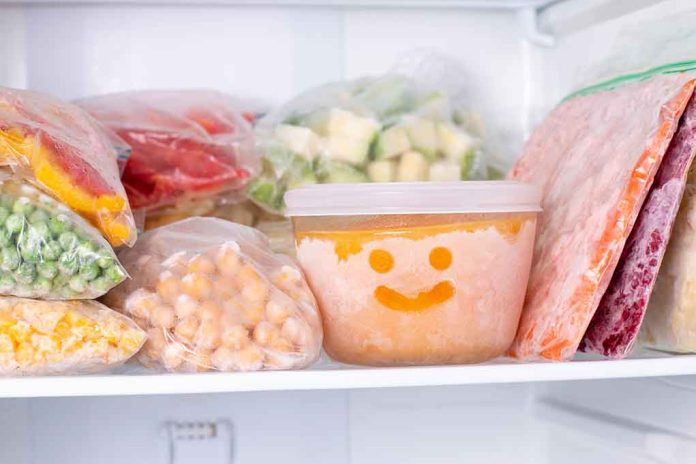(HealthyExaminer.com) – Food safety is more than just preparing meals at the right temperatures. It’s equally important to avoid food spoiling in the freezer, leading to food waste or to food-borne illness. Freezing food safely can save you money by decreasing food waste, and it can even simplify meal planning. Since food won’t keep indefinitely in the freezer, the following tips will guide you through correctly preserving your food so it doesn’t spoil.
How to Freeze Food Safely
Whether you shop the aisles of your local grocery store yourself or have your groceries delivered, it’s important to know how to properly store frozen food and correctly freeze leftovers. These tips can help you keep your food safe and to know exactly what to do in the event of a power outage due to an emergency or natural disaster.
1. Prioritize Organization
Freezers work best when they are mostly full but still have room for airflow. Label each item in your freezer with the date it was frozen and the date the item will expire. Keep items that expire first located near the front of your freezer, or near the top in freezer chests. This is how long you should store food according to the U.S. Department of Agriculture:
- Bacon and sausage: 1 to 2 months
- Casseroles: 2 to 3 months
- Egg whites or egg substitutes: 12 months
- Frozen dinner and entrees: 3 to 4 months
- Gravy, meat, or poultry: 2 to 3 months
- Ham, hot dogs, and lunchmeats: 1 to 2 months
- Meat, uncooked roasts: 4 to 12 months
- Meat, uncooked steaks or chaps: 4 to 12 months
- Meat, uncooked ground: 3 to 4 months
- Meat, cooked: 2 to 3 months
- Poultry, uncooked whole: 12 months
- Poultry, uncooked parts: 9 months
- Poulty, uncooked giblets: 3 to 4 months
- Poultry, cooked: 4 months
- Soups and stews: 2 to 3 months
- Wild game, uncooked: 8 to 12 months
2. Know What Can and Can’t Be Frozen
It’s important to understand that not every food can be frozen safely. Egg-based sauces will curdle in the freezer. Fruit and vegetables with a high water content are likely to get mushy and lose their natural flavor and texture. Being knowledgeable about what will and won’t freeze well can help you keep your freezer stocked with the right foods for your family.
3. Freeze Before Use-By Date
Items that are frozen after their use-by date will not be safe to eat and could put your health at risk. Be sure to check the use-by dates before purchasing items and before freezing. This is particularly important when it comes to meat you plan to freeze. Some discounted grocery items could be at their use-by date already or close to it. Being aware of the use-by date can help you properly freeze items within the appropriate timeframe.
4. Properly Prepare Fresh Vegetables Before Freezing Them
A technique called blanching can be used to get your fresh vegetables ready for the freezer. The following video will show you how to boil, ice, and then freeze your vegetables safely. This can help preserve their nutritional value while helping to avoid food spoilage and waste.
https://www.youtube.com/watch?v=svHjQwJcJaE
5. Know Your Freezer’s Temperature
Keep a thermometer in your freezer if it doesn’t have one built in. Freezer temperatures should stay between 0F(or -18 C) according to the United States Food and Drug Administration (FDA). You can also purchase an alarm system that will notify you if there’s a power outage that could impact the safety of your frozen goods.
6. Cool Food Before Freezing
Freezing leftovers can be a great way to avoid food waste. Make sure to cool hot foods before freezing them. Placing hot foods in the freezer could cause other stored foods to thaw, putting them at risk of spoilage.
7. Properly Store Foods
Store items in properly sealed containers or freezer bags. Failing to properly wrap and store food could result in freezer burn, which is when food dries out in the freezer due to improper storage conditions. It won’t make the food unsafe to eat, but it could drastically impact the taste and quality of the food. It’s also possible that improperly stored food can become exposed to germs, leading to food-borne illness.
8. If In Doubt, Throw It Out
Look for signs that the item has spoiled. If it’s changed color or if you’ve had a lengthy power outage that makes you doubt the safety of your food, toss it! Don’t put your health at risk if an item looks, smells, or tastes like it may have spoiled.
You can never be too careful when it comes to food safety. The steps you take to properly freeze and store your food could help save you time and money and limit your household’s food waste. Safely frozen foods can support a healthy diet and good nutrition for you and your loved ones.
Copyright 2023, HealthyExaminer.com














